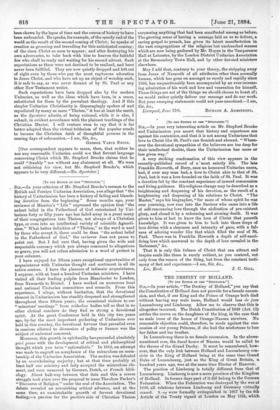[To THE EDITOR OF TEE " SPECTATOR."1
your very interesting article on Mr. Stopford Brooke- and Unitarianism you assert that history and experience are against his contention, and that it is not among Unitarians that love to Christ like St. Paul's can flourish and abound. " Where- ever the devotional sympathies of the believers are too deep for their intellectual doubts, there the Unitarianism has more or less given way."
A very striking confirmation of this view appears in the• recently-published record of a 'most saintly life. The late Franklin Howorth, of Bury, once an honoured Unitarian name, had, if ever any man had, a love to Christ akin to that of St. Paul, but it was a love founded on the faith of St. Paul. It was• a devotion fed by the constant experience of inward communion and living guidance. His religions change may be described as a heightening and deepening of his devotion, as the result of a heightening and deepening of his relations to Christ. " The- Master," says his biographer, "for more of whose spirit he was ever yearning, now rose into the Saviour who came into a life of self-renouncing love through the abdication of pre-existent glory, and closed it by a redeeming and atoning death. It was- given to him at last to know the love of Christ that passeth knowledge. It was given to him to look into those deeps of love divine with a clearness and intensity of gaze, with a ful- ness of adoring wonder like that which filled the soul of St. Paul. There was in Franklin Howorth a depth of self-sacri- ficing love which answered to the depth of love revealed in the- Redeemer," &c.
That it is only this fulness of Christ that can attract and inspire souls like these is surely evident, as you contend, not only from the reason of the thing, but from the constant testi- mony of fact and experience.—I am, Sir, &c.,


































 Previous page
Previous page